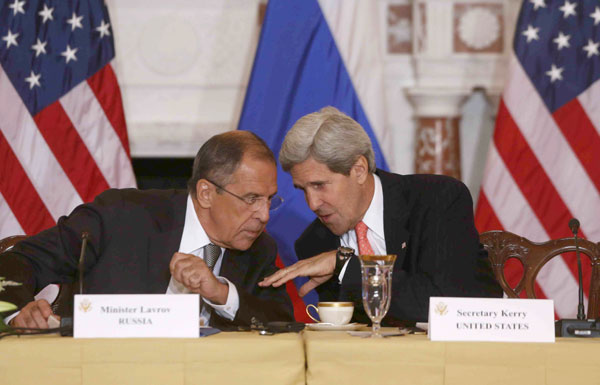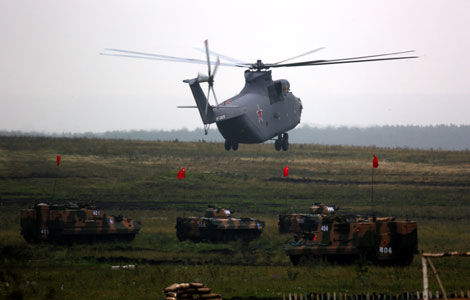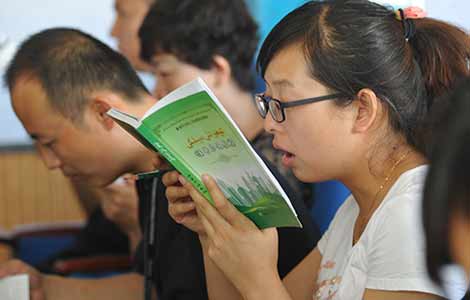Chilly talks expected for US, Russia
Updated: 2013-08-10 09:14
(Agencies/China Daily)
|
||||||||
Scuttled summit, Snowden stain meeting on Syria and arms control
The crisis in Syria, arms control and missile defense headline what are expected to be chilly talks between US and Russian foreign and defense ministers, a sit-down tainted by the case of US National Security Agency leaker Edward Snowden, which led US President Barack Obama to cancel his upcoming meeting with his counterpart Vladimir Putin.
 |
|
US Secretary of State John Kerry (right) talks with Russian Foreign Minister Sergei Lavrov in Washington on Friday. An upcoming sit-down between foreign and defense chiefs from the US and Russia is expected to be awkward after Russia gave US National Security Agency leaker Edward Snowden temporary asylum. Charles Dharapak / Associated Press |
Russia's decision last week to grant temporary asylum to Snowden put a damper on US-Russia relations, which were already on a slide. Then, on Wednesday, Obama canceled his summit with Putin, planned for early September in Moscow, because of what the White House called a lack of "significant progress" on a wide array of critical issues.
"Summits of leaders tend to be designed around making progress on significant issues," White House spokesman Jay Carney said on Thursday. "And we had not seen that progress sufficiently on a range of issues to merit a summit."
The scuttled summit means that talks scheduled on Friday in Washington between US Secretary of State John Kerry, US Defense Secretary Chuck Hagel and their Russian counterparts Sergei Lavrov and Sergei Shoigu will be awkward at best.
US-Russia discord had been simmering since Putin regained the Russian presidency more than a year ago. On returning to power, he adopted a deeply nationalistic and more openly confrontational stance toward the United States than the man he had chosen to succeed him as president in 2008, Dmitry Medvedev, whose tenure roughly overlapped Obama's first term in the White House.
The US is upset about Moscow's backing of Syrian President Bashar al-Assad in the country's civil conflict. The two nations also have been at odds over Russia's domestic crackdown on civil rights, a US missile defense plan for Europe, trade, global security, human rights and US adoptions of Russian children.
The Kremlin expressed disappointment that the White House canceled the summit and blamed it on Washington's inability to develop relations with Moscow on an "equal basis". Putin's foreign affairs adviser, Yuri Ushakov, added that the decision was "clearly linked" to the Snowden case, a situation that he said wasn't of Russia's making.
Carney said Snowden was a factor in canceling the summit, but not the only one. Carney said the US would continue to press Russia to return Snowden to the US to face charges for the unauthorized public release of classified information.
"We have a lot of fish to fry, if you will, with the Russians. We have a lot of issues to engage with the Russians over," Carney said, emphasizing that Snowden was not the main focus of US engagement with Russia.
"But it is not something that we're dropping, by any means, and, you know, it remains our position that there is ample legal justification to return Snowden to the US," he said.
Three meetings were scheduled for Friday. Hagel and the Russian defense minister were to meet separately in the morning, followed by the meeting of the foursome. In the afternoon, Kerry and his counterpart were to hold a bilateral meeting.
US State Department spokeswoman Jen Psaki said the meetings were aimed at making progress on key issues, and not focused specifically on setting the groundwork for a Putin-Obama summit.
"I think there's an openness to doing that in an appropriate time where there's an opportunity to make progress," she said. "But I don't expect that's going to be a major part of the focus" of the meetings.
Most Viewed
Editor's Picks

|

|

|

|

|

|
Today's Top News
Searching on missing Chinese is still underway
Human H7N9 infection confirmed
Beijing busts big fraud gang
Chilly talks expected for US, Russia
40 killed in attacks across Iraq
India, Pakistan exchange fire
One missing Chinese found safe
50 medical workers die in 50-year foreign aid
US Weekly

|

|












